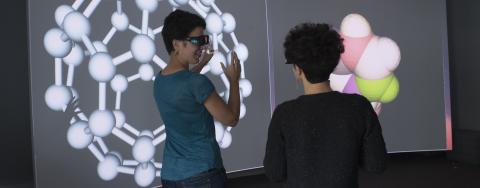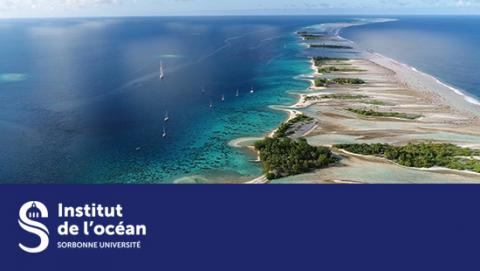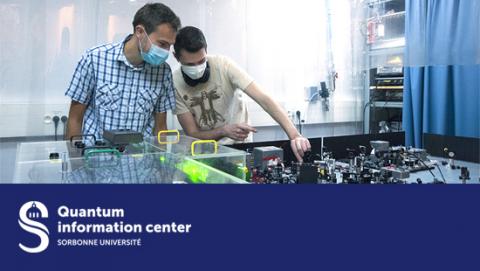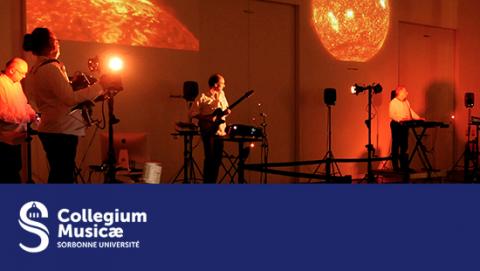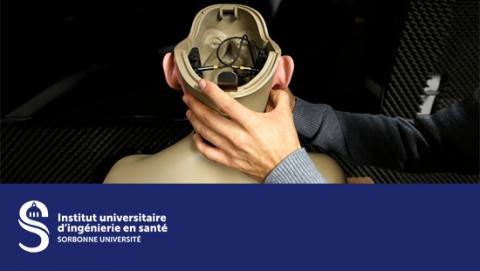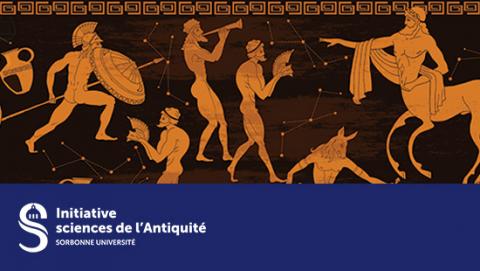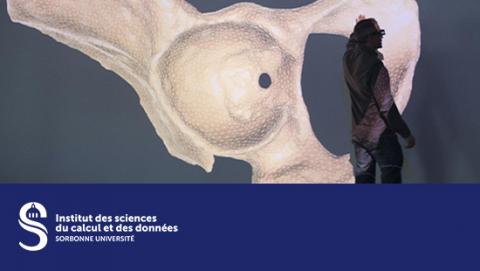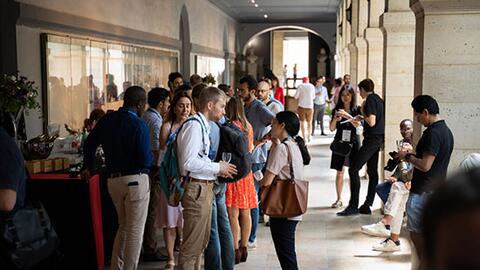
Multidisciplinary institutes and initiatives
To respond to the challenges of contemporary society, which go beyond the boundaries of a single discipline, the Sorbonne University Alliance has created multidisciplinary institutes and initiatives.
The Sorbonne University Alliance brings together six higher education and research institutions covering all disciplinary fields of arts, humanities, medicine, science, engineering, technology and management. The diversity of its members promotes a comprehensive approach to teaching and research. It supports access to knowledge for all and develops numerous joint programs in lifelong learning across all disciplines, in research and innovation, and in the use and dissemination of their results.
The Sorbonne University Alliance currently boasts several multidisciplinary thematic institutes and initiatives. Bringing together several institutions, they seek to make a range of disciplines work together, freeing them from traditional divisions and thus providing researchers from different backgrounds with the opportunity to compare their knowledge and experience.
The institutes are financed partly by the Idex (the French Excellence Initiative) and partly by external project funding (ANR, European Commission, industrial partners, etc.)
Institutes
The ambition of the Sorbonne University Alliance Global Health Institute (ASU-GHI) is to improve access to care, prevention and equity in health through a systemic and participatory approach integrating the study of biological, environmental and psychosocial determinants of health.
To achieve this, ASU-GHI brings together the complementary expertise of members of the three faculties of Sorbonne University, the Museum National d'Histoire Naturelle, Insead, Inserm, CNRS and the Université de Technologie de Compiègne, in association with numerous European and international research institutions, the fruit of the Alliance's international partnerships.
ASU-GHI's identity is based on a common foundation and purpose: access to healthcare, and on the identification of the Alliance's areas of excellence in global health:
- Santé et Environnement
- Autonomie, Vieillissement, Vulnérabilité
- Cancer
- Nutrition
These areas of excellence are all viewed through the perspectives of biomedical humanities, health economics, digital health and technologies.
The Institute will aim to promote innovative transdisciplinary research by facilitating collaboration between researchers from the Alliance and relevant partner institutions, to support the production of original knowledge with potential practical applications, to encourage the development of new training courses in research areas of interest, and to communicate about the health needs of populations in order to support decision-making and the development of global public health policies.
Director : Juan Fernando Ramirez
Directors and Deputy Directors: Jean-Michel Oppert, Cécilia Bognon-Küss, Françoise Guillo-Benarous, Anne-Lise Paradis, Fabrice Carat, Claire Rossi, Timothy Van-Zant
The Antiquity Sciences Initiative (ISAntiq) becomes the Institut des Sciences de l'Antiquité. Its ambition is to :
- Broaden the community of antiquarians to include all members of the Sorbonne University Alliance, with a view to multi-, inter- and trans-disciplinary openness.
- Improve the visibility of the existing training offer, while decompartmentalizing traditional courses.
- Enhance the employability of our students.
- Internationalize our courses.
The Institute's activities are based on the transformative potential of new technologies applied to philological and archaeological sources. By highlighting the exchanges between peoples, the dynamics of interaction and multilingualism in ancient civilizations, the Institute promotes an open and inclusive vision of antiquity, aimed at fostering a broader political and social dialogue on the relationship between linguistic diversity and cultural identities.
Director: Alessandro Garcea
Assistant Directors: Alexandre Farnoux, Didier Marcotte, Caroline Michel D'Annoville, Carole Roche-Hawley, Giulia Scalas
Overview:
The Quantum Information Center Sorbonne (QICS) aims to coordinate research, teaching and outreach efforts within the Sorbonne University Alliance on quantum information - quantum computing and communications - and its impact on other fields. It brings together a broad community ranging from computer science and physics to mathematics and the humanities.
The general objectives of the center can be summarized as follows:
- Promote excellence in research and collaborative work within the Sorbonne University Alliance
- Develop a coherent teaching program, from undergraduate to doctoral studies and continuing education.
- Raising public awareness, opening up to other scientific fields and industry.
Challenges and impacts:
Born in the 1980s, quantum information has demonstrated that basing computers and communications on quantum physics could dramatically improve their performance and achieve results previously thought impossible. Many industries around the world could benefit from quantum information; as a result, a race for research, innovation and talent has begun.
Cross-disciplinary dimension:
QICS draws on the unique body of knowledge and skills existing within the Sorbonne University Alliance, from fundamental computer science to quantum physics, from experimental demonstrations of quantum advantage to the social, economic and philosophical sciences of digital technologies. QICS aims to intensify interactions between experimental and theoretical research and engineering, while exploring the societal implications of this new way of processing information. It also aims to increase teaching efforts in this field, raise awareness among our partners and collaborate with industry within innovation ecosystems.
Scientific themes:
Development of hardware and software for quantum computing and simulation
Development of hardware and software for quantum communications
Theoretical study of the foundations of quantum advantage
Impact of quantum information in other fields, from classical cryptography to human sciences and economic implications.
Director: Valentina Parigi
Deputy Director: Frédéric Grossehans
The Collegium Musicæ is a multi-disciplinary institute that brings together musicians, researchers and academic researchers from a wide range of backgrounds and expertise, united around the theme of music as a multifaceted object.
Relying in particular on a dozen institutions, the institute brings together all the knowledge and skills on music within the scope of the Sorbonne University Alliance, in the service of a cross-disciplinary approach to this discipline. It promotes synergies between research, musical creation, training, heritage and musical practice.
The range of disciplines brought together - musicology, acoustics, history, cognitive sciences, computer science and digital technologies, biomechanics, etc. - enables the Collegium Musicæ to offer a comprehensive range of services. The insitutute carries out wide-ranging projects, underpinned by five program axes:
- Improvisation, Learning, Artificial Intelligence
- Yesterday's instrument for tomorrow's instrument
- Non-dedicated music production venues
- Music and medicine
- Building musical knowledge
The Collegium Musicæ will award doctoral contracts to encourage new scientific collaborations, including between institutes and initiatives of the Sorbonne University Alliance. They will underpin interdisciplinary research projects between the humanities, the exact sciences and medicine, in one of the five program areas listed above. Supported by two co-directors from two different research units of the Sorbonne University Alliance, or from an external laboratory if necessary, these doctoral contracts will expand the existing community of doctoral students within the ASU “Music and Science” doctoral program. They will also contribute to the scientific life of the institute (study days, colloquia, seminars, international summer schools, etc.).
Director: Théodora Psychoyou
Deputy Director: Jean-Loïc Le Carrou
An interdisciplinary institute to meet the major scientific, industrial and societal challenges of materials science.
Materials are at the heart of important sectors of the economy and are omnipresent in society. Sorbonne University's Institute of Materials Science fosters innovation, interdisciplinarity and fundamental and applied research in materials science to help meet major societal and economic challenges.
The Sorbonne University Alliance brings together major players in the materials field. The Institute's mission is to strengthen their collaboration by supporting ambitious research projects, promoting new interdisciplinary training initiatives and developing international exchanges with academia and industry, thus actively contributing to the Alliance's international reputation.
The Institute's scope covers current and future research in materials science, at the interface of several disciplines: chemistry, physics, earth sciences, heritage and engineering. In the field of energy and sustainable development, topics may include energy production and storage, or the life cycle of materials. Bio-assisted synthesis, optimized or targeted for specific properties, and surface functionalization are examples relevant to the industrial and healthcare fields. The institute is also interested in the new fundamental properties of hybrid, functional or reduced-dimension materials and the devices that can emerge from them.
Finally, the development of innovative techniques and research methods in materials engineering is a natural theme for the Institute.
Director: Xavier Carrier
Director and deputy directors : Sophie Cassaignon, Zoheir Aboura, Franck Vidal
Overview:
The Sorbonne University Alliance’s Ocean Institute, in association with the French Navy and naval school, brings together marine and maritime sciences.
Challenges and impacts:
Marine and maritime sciences play an important role in a range of fronts of knowledge and economic and societal issues: sustainable development, food, energy, geostrategy...
Transdisciplinary aspects:
Relying on a large number of laboratories and the Alliance’s five marine stations, the Institut de la Mer assembles a strategic set of disciplinary fields and skills, conducive to the emergence of new concepts, innovative projects and unexpected synergies.
Scientific themes:
The institute studies the sea as part of the history of the Earth, life and society. This approach is undertaken for analyses of the sea at different time scales and periods (geological, prehistoric, historical, current) and is a firmly original aspect of the institute, made possible in large part thanks to the diverse components that make up the Alliance.
The Ocean Institute also centers on the specificities of marine and coastal environments in terms of risks and adaptations to global changes. This subject is at once topical and near inescapable in many disciplines, which require a transdisciplinary approach that takes into account the oceanic and coastal specificities of impacts as well as the notion of marine biomes, maritime geopolitics and marine traffic.This will involve studying the expansion of marine and maritime traffic in all its forms—ships, people and cultures, goods, pandemics, species, etc. in the Mediterranean region— and their ecological and geopolitical implications, such as the issues of appropriation and exploitation of the oceans, which may become the source of tomorrow's conflicts.
Director: Christophe Prazuck
Director and deputy director : Nadia Améziane, Jean-Olivier Irisson
The Sorbonne University Institute for Environmental Transition (SU-ITE) aims to create innovative education and research dynamics in major issues of the environment, sustainable development and the construction of a post-COP 21 society.
To this end, it relies on its ability to implement interdisciplinary and inter-sectoral approaches to contribute to the environmental transition of societies. It encourages interactions between research and education teams and the stakeholders of society (political, economic, social).
The Institute's work in education and research is structured around three main scientific areas: controlling climate change and its consequences, creating the conditions for responsible and sustainable use of resources and energies, and governing biodiversity and drawing inspiration from nature.
The mission of the University Institute for Health Engineering (IUIS) is to encourage educational, scientific and technological innovation in health by providing a structure to host multidisciplinary teams grouped around three themes to be approached in an interactive way: engineering, health, humanities and social sciences.
The IUIS thus makes it possible to federate, coordinate and develop education, research and development, innovation and transfer activities on a larger scale.
Director: Isabelle Bloch
Deputy Director: Geoffroy Canlorbe
The Heritage Observatory (OPUS) promotes a broad, innovative and operational field through a synergy of scientific, pedagogical and heritage resources of the Sorbonne University Alliance. The Observatory, using different approaches and tools, links objects, specialities, temporalities, to the concept of heritage (cultural and natural).
The complementary nature of the Sorbonne University Alliance's scientific expertise in these heritage issues, as well as the extraordinary range of expertise and technical resources available to it, is a major asset in terms of research, the dissemination of knowledge, and the management, conservation and promotion of collections.
It has identified four main areas of research: to deal with heritage objects in all their diversity; to cultivate an interdisciplinary approach, to keep an active watch on the evolution of the concept of heritage and the phenomena of the preservation of heritage; and to affirm the social usefulness of the Alliance's work.
Director: Nathalie Ginoux
Assistant director: Olivier Aïm
SCAI, the Sorbonne Center for Artificial Intelligence, brings together a strategic range of modern artificial intelligence disciplines in a unique location in the heart of the Latin Quarter.
SCAI's ambition is to make a significant contribution to the excellence of interdisciplinary research and education in artificial intelligence by promoting exchanges between researchers, academics, students and industrialists.
Its aim is to showcase the Sorbonne University Alliance's know-how in the field of artificial intelligence and to be a gateway for academic and industrial partners.
This project is supported by numerous academic researchers from the three faculties of Sorbonne University and the institutions of the Sorbonne University Alliance, who have been mobilised to ensure its success.
Director: Gérard Biau
The Institute of Computing and Data Sciences (ISCD) is a research, expertise and educational centre in scientific computing, based on high-performance computing and visualisation resources.
Dedicated to research activities in digital simulation, it is a structure hosting multidisciplinary teams of the Sorbonne University Alliance who are engaged in a collaborative project in scientific computing.
Its mission and objectives are to accompany, support, structure and stimulate projects from the community of researchers, engineers and students of the
Sorbonne University Alliance involved in scientific computing and simulation.
2025-2029 Initiatives
Call for post-doctoral projects
Post-doctoral projects should be sent directly by doctoral students or PhDs less than 5 years old to the following address: initiative.europe@sorbonne-universite.fr, with celine.spector@sorbonne-universite.fr and laurent.warlouzet@sorbonne-universite.fr in copy.
This project must be in line with one of the priorities of the Europe Initiative. In addition, the Europe Initiative aims to encourage intellectual collaboration between different colleagues at SU, and in the wider Sorbonne University Alliance. Consequently, projects that are interdisciplinary in nature or contribute to the formation of a large-scale research project (ANR, ERC, Horizons, COST) will be given priority. Candidates must have made prior contact with a research director who is part of the Europe Initiative, and who must agree in writing to act as referent for the duration of the project.
Timetable:
- Between March 26 and May 5: submission of post-doctoral projects by candidates - doctoral students at the end of their thesis or PhDs.
- Between May 12 and June 2: selection of candidates.
- Start of contract in September
Coordinators:
- Céline Spector, SND UMR 8011, Sorbonne University
- Laurent Warlouzet, SIRICE, UMR8138, Sorbonne University
Within the Sorbonne University Alliance, many researchers are working on sensors for the environment and health, in response to growing societal needs for increasingly precise spatial and temporal mapping. This expansion raises not only technical/technological challenges, but also ethical, sociological and philosophical questions. The T-CAPES initiative aims to bring all players together to create a strong and visible community, both within and beyond ASU. We will support the development of new sensors, their integration into electronic systems, as well as their deployment, particularly in the context of participatory science, while engaging in reflection on their uses.
Coordinators :
- Emmanuel Maisonhaute, Institut Parisien de Chimie Moléculaire, Sorbonne University
- Hakeim Talleb, Laboratoire de Génie Electrique et Electronique de Paris, Sorbonne University
The circulation, through transfer and hybridization, of texts, representations, practices, goods and/or people, both within the Middle Ages and into the modern and contemporary periods, is the focus of the initiative's project. MeCir will federate agile and collaborative interdisciplinary research across a broad chronology, renewed by new technologies (digital humanities, archaeometry, AI), on these medieval circulations that fuel great linguistic, literary and artistic creativity. Thanks to the copyists and translators who enabled the transmission and enrichment of the ancient heritage, the men and women of the Middle Ages developed new political, legal, religious, artistic and scientific cultures. This heritage has been grafted onto an imaginary of the Middle Ages that feeds films, video games, comic strips, forms an inescapable component of contemporary culture and extends our fields of research.
Coordinators:
- Béatrice Caseau, Orient & Méditerranée UMR 8167, Sorbonne University
- Florence Bourgne, CEMA UR 2557, Sorbonne University
- Joëlle Ducos, STIH UR 4509, Sorbonne University
- Elisabeth Yota, Centre André Chastel UMR 8150, Sorbonne University
- Frédéric Billiet, IReMUS UMR 8223, Sorbonne University
This project aims to study food as a “total social fact” of present and past societies, by bringing together within an interdisciplinary scientific community the very many colleagues working - in the 3 faculties and various establishments of the ASU - on one or more aspects of this question. The diversity and complementarity of our approaches, which are unique in France, will be reflected in 7 cross-disciplinary areas of research, ranging from food cultures and their “patrimonialization”, to their mutations and hybridizations up to the present day, to the very high stakes involved in environmental and public health issues, to the evolution since prehistoric times of the realities and representations of food, and the multiple frontiers of food. This project will also include an innovative training component, the structuring of an international network and an opening up to a wide public in order to meet the very strong social demand on this theme.
Coordinators
- Fabien Faugeron, UMR 8596, Sorbonne University
- Sylvaine Boulanger, UR Médiations, Science des Lieux, Sciences des Liens, Sorbonne University
- Karine Clément, UMRS 1269, Sorbonne University
- Khadija El Hadri-Zegouagh, UMR 8256, Sorbonne University
- Christophe Lavelle, UMR7196, Museum National d'Histoire Naturelle
- Caroline Marti, UR 1498 GRIPIC - CELSA , Sorbonne University
The central theme of the Life Sciences at Interfaces Initiative is the exploration of fundamental questions in biology, using concepts and methods from other scientific disciplines. The aim is to unite a broad community around a modern approach to the study of living organisms. The project has two main scientific thrusts: engineering for life and theoretical approaches to modeling biological systems. These two axes will promote the structuring of interfaces with chemistry, engineering and mathematics, as well as continuing to enrich those with physics and computer science. The actions will be open to all members of the Alliance Sorbonne Université (ASU), which will enable the emergence of new themes and the structuring of a rich and diversified community in view of ASU's considerable potential and the strategic relevance of sciences at the interfaces of living systems.
Coordinators:
- Gilles Fischer , LCQB, IBPS, Sorbonne University
- Christine Ménager , Phenix, Sorbonne University
The New Frontiers in Molecular Reactivity (iDream) Initiative represents an opportunity for the ASU scientific community to address future challenges in a unique way. The goal is to bring together molecular reactivity and emerging technologies in fields as diverse as biomimicry, CO2 recovery, heritage, the quantum world, and new therapeutic approaches. The goal of iDream is to strengthen the impact of the SU Alliance's research by creating an interdisciplinary and international community, from students to researchers, involving multiple skillsets in molecular reactivity.
Coordinators
- Marc Robert, IPCM, Sorbonne University
- Jean-Philip Piquemal, LCT, Sorbonne University
Digital Humanities (DH), as a transdiscipline, transforms approaches in Arts and Humanities and Social Sciences (HSS) by integrating digital methods. Faced with the methodological and epistemological revolution constituted by Digital Humanities, it is crucial for an ambitious and forward-looking university to have a dedicated structure. This initiative would make it possible to structure and make HN visible within the alliance. This would further enable the institution to integrate a dynamic of innovation and respond to current challenges related to the use of digital technology in HSS. Led by SU and its partners, the HN initiative aims to address the challenges related to the analysis of large sets of digital data and the ethical and methodological issues raised by Artificial Intelligence. It draws on solid and recognized scientific expertise to develop interdisciplinary thinking while offering innovative training that meets the needs of researchers and professionals.
Coordinators
- Andrea Del Lungo, Sorbonne University
- Motasem Alrahabi, Sorbonne University
The iRHiST project aims to support the emergence, within the Sorbonne University Alliance, of a research and training network dedicated to the themes of the history of science and technology (HST). Currently relatively invisible within the Alliance, HST is at the heart of the concerns of a major scientific university in a complex world where the place of science and technology is both increasingly crucial and contested. The fundamental nature of this field is demonstrated by the fact that more than a hundred researchers, lecturers (Faculty of Arts, Faculty of Science and Engineering, MNHN, UTC, including the CNAM), as well as staff from the libraries, archives and collections (BSU), already devote a significant part of their activity to it. HST also features in the training offerings, but without overall coherence. By synergizing existing resources and seeking to structure and strengthen them through targeted actions, our initiative aims to position the Alliance as a player in the renewal of HST at the international level.
Coordinators:
- David Aubin, IMJ-PRG, Sorbonne University
- Nathalie Rousseau, Orient & Méditerranée, Sorbonne University
The molecular scale finds itself at the center of many disciplines: chemistry, physics, biology, medicine, geosciences and others. Our goal is to strengthen the impact of Sorbonne University Alliance research by strengthening resources across a selection of projects that involve multiple molecular science and engineering skills.
Challenges and impacts:
The molecule corresponds to the elementary and organisational scale of matter, from the atom to the nano-object, and is therefore at the crossroads of many scientific concerns and primordial societal issues such as health, energy, the environment, information, all in the context of a circular economy. Indeed, all major experimental scientific disciplines rely heavily on molecular properties to analyze, understand, reproduce and manipulate the complexity of matter.
Transdisciplinary aspects:
A multidisciplinary approach at the molecular level is essential to meeting major scientific challenges around fundamental or applied questions such as biomimicry, artificial photosynthesis, the cosmic origins of the molecular bricks of life; artificial life, storage and transmission, molecular and supramolecular information, catalysis, theoretical modelling of complex molecular assemblies, molecular machines and more.
Director: Matthieu Sollogoubz
Read our interview with Mattieu Sollogoubz

